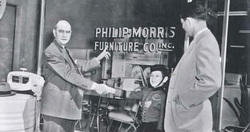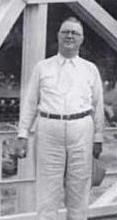Encyclopedia of Southern Jewish Communities - Houma, Louisiana
Houma: Historical Overview
The city of Houma, Louisiana was founded in 1834 to establish a more central seat for Terrebonne Parish. By the time Houma was officially incorporated in 1848, the area was booming economically with sugar cane plantations as well as seafood and logging industries. The railroad that linked Schriever to Houma, built in 1872, soon became instrumental in increasing trade inside and outside of Terrebonne. This economic activity attracted a small number of Jewish settlers to Houma. Even though the Jewish population has always been small, there have been a number of notable Jews who have made a large impact on Houma.
Stories of the Jewish Community in Houma

The Lewald Family
The first Jewish family to set down roots in Houma was the Lewalds. Louis Lewald was born in 1852 in Teflitz, a town not far from Prague in what is now the Czech Republic. He was 17 years old when he immigrated to Dulac, Louisiana. In 1872, Lewald moved to Houma and opened up a store on Main Street right next to the bayou. Boats would travel up and down Bayou Terrebonne and could pull up right to Lewald’s back door. His wife Hannah helped in the store and added a dry goods department. Lewald’s in-laws, the Schwartzes, ran two stores in the same area. Wolf Schwartz had come to Houma from New Orleans and opened a haberdashery on the bayou side of Main Street.
Lewald became a successful merchant and a highly respected citizen of Houma. He served as alderman in 1896 and was a member of the parish school board. He was also a charter member of the Knights of Pythias Lodge in Houma. At one time, Lewald owned nearby Felicity Island (located in Terrebonne Parish) and dabbled in the real estate business. By the time he died in 1907, Lewald’s had become one of Houma’s most popular dry goods stores. His sons, Alfred and Ignatius, carried on the business even after their mother died in 1936. His daughter Amelie helped to establish the first free school lunch program in Terrebonne in 1928. Later, after Alfred left the business, Ignatius sold the store.
Jewish Businesses in Houma
In the 20th century, Houma Jews continued to concentrate in retail trade. In 1907, brothers Leon and Maurice Heymann, who had been born in New Orleans, opened the Houma Bargain Store. Since their mother was from France, the Heymanns knew enough French to communicate with their many Cajun customers. The brothers’ tenure in Houma was brief. Maurice left for Lafayette after a few years and Leon sold the store in 1920 and moved back to New Orleans. In 1909, Alsatian-born cousins Maurice Joseph and Maurice Levy bought an existing dry goods store in Houma, renaming it “The Leader.” In 1914, Julien Joseph, Maurice’s brother, came to Houma from Paris at the age of 18 to work in the store. Maurice Joseph died in 1956 and Julien ran the store until 1959, when shut The Leader’s doors and retired.
Samuel and Leon Polmer came to Terrebonne from Donaldsonville and, at first, ran a soda pop factory. In 1909, they bought the Ducros plantation. About a decade later, they bought a store that catered to the plantation hands in the area. During the 1920s, the brothers opened three other plantation stores in the parish. In 1911, Sam began his 30-year tenure as a representative for the first ward on the parish police jury. Through this role, he would become a political ally of Governor Huey Long. Sam Polmer maintained this position until his death on December 31, 1940. Leon’s sons, Irvin and Mervin Polmer continued to run two of the plantation stores. Before Irvin and Mervin died in 1973, they renamed the Ducros Plantation after themselves.
In 1933, widow Augusta Ferber moved to Houma with her three children, Dora, Leo, and Nathan. Leo and his sister Dora opened the Palais Royale, a ladies ready-to-wear store while Nathan opened his Man’s Shop right next door. The Ferber family was very successful all the way into the 1980s when they sold their businesses. In 1950, Philip Solsolsky and Morris Itzkovitch opened up a retail furniture store. They did not like the name Solsolsky-Iztkovitch for their establishment and decided to use their first names instead, calling it the Philip-Morris Furniture Company.
The first Jewish family to set down roots in Houma was the Lewalds. Louis Lewald was born in 1852 in Teflitz, a town not far from Prague in what is now the Czech Republic. He was 17 years old when he immigrated to Dulac, Louisiana. In 1872, Lewald moved to Houma and opened up a store on Main Street right next to the bayou. Boats would travel up and down Bayou Terrebonne and could pull up right to Lewald’s back door. His wife Hannah helped in the store and added a dry goods department. Lewald’s in-laws, the Schwartzes, ran two stores in the same area. Wolf Schwartz had come to Houma from New Orleans and opened a haberdashery on the bayou side of Main Street.
Lewald became a successful merchant and a highly respected citizen of Houma. He served as alderman in 1896 and was a member of the parish school board. He was also a charter member of the Knights of Pythias Lodge in Houma. At one time, Lewald owned nearby Felicity Island (located in Terrebonne Parish) and dabbled in the real estate business. By the time he died in 1907, Lewald’s had become one of Houma’s most popular dry goods stores. His sons, Alfred and Ignatius, carried on the business even after their mother died in 1936. His daughter Amelie helped to establish the first free school lunch program in Terrebonne in 1928. Later, after Alfred left the business, Ignatius sold the store.
Jewish Businesses in Houma
In the 20th century, Houma Jews continued to concentrate in retail trade. In 1907, brothers Leon and Maurice Heymann, who had been born in New Orleans, opened the Houma Bargain Store. Since their mother was from France, the Heymanns knew enough French to communicate with their many Cajun customers. The brothers’ tenure in Houma was brief. Maurice left for Lafayette after a few years and Leon sold the store in 1920 and moved back to New Orleans. In 1909, Alsatian-born cousins Maurice Joseph and Maurice Levy bought an existing dry goods store in Houma, renaming it “The Leader.” In 1914, Julien Joseph, Maurice’s brother, came to Houma from Paris at the age of 18 to work in the store. Maurice Joseph died in 1956 and Julien ran the store until 1959, when shut The Leader’s doors and retired.
Samuel and Leon Polmer came to Terrebonne from Donaldsonville and, at first, ran a soda pop factory. In 1909, they bought the Ducros plantation. About a decade later, they bought a store that catered to the plantation hands in the area. During the 1920s, the brothers opened three other plantation stores in the parish. In 1911, Sam began his 30-year tenure as a representative for the first ward on the parish police jury. Through this role, he would become a political ally of Governor Huey Long. Sam Polmer maintained this position until his death on December 31, 1940. Leon’s sons, Irvin and Mervin Polmer continued to run two of the plantation stores. Before Irvin and Mervin died in 1973, they renamed the Ducros Plantation after themselves.
In 1933, widow Augusta Ferber moved to Houma with her three children, Dora, Leo, and Nathan. Leo and his sister Dora opened the Palais Royale, a ladies ready-to-wear store while Nathan opened his Man’s Shop right next door. The Ferber family was very successful all the way into the 1980s when they sold their businesses. In 1950, Philip Solsolsky and Morris Itzkovitch opened up a retail furniture store. They did not like the name Solsolsky-Iztkovitch for their establishment and decided to use their first names instead, calling it the Philip-Morris Furniture Company.
 Leopold Blum
Leopold Blum
Jews have played an active part in Houma’s shrimp and seafood industry, which has long been central to the town’s economy. In the early 20th century, traveling salesman Leopold Blum came to Terrebonne Parish. During his trip, he noticed fishermen were drying shrimp for their own use on boards in the sun. A man who had a barn filled with sacks of dried shrimp asked Blum to sell them. Blum agreed, and thus started the dried shrimp industry in Terrebonne Parish. In 1912, Leopold went into business with Shelley Bergeron, establishing Blum and Bergeron Inc., a successful dried shrimp company. In 1955, Bergeron’s heirs sold their interest to the Blum family, who continue to run the business today. Leopold Blum became an important civic leader in Houma. Not only was he a prominent businessman, but Blum also served as alderman from 1928 until 1946. Tommy Cobb, Leopold’s grandson, started working for Blum and Bergeron when he was 15 years old. Later, he took over the business as president.
Organized Jewish Life in Houma
Cobb was a longtime leader of Houma’s small Jewish community, which numbered 50 people in 1937. At some point, the small group began to meet together for informal worship. They named themselves Congregation Beth-El, but never had a building or a full-time rabbi. The group would usually meet at Cobb’s house on the Friday nights when they held lay-led services. Most of Houma’s Jews also belonged to congregations in New Orleans. Cobb was a longtime member of Temple Sinai in New Orleans. Most of Houma’s Jews were Reform, but proximity to New Orleans enabled more traditional Jews to maintain their traditions. When Shirley Slater moved to Houma in 1931, hers was the only Jewish family that kept kosher. Her mother would send for kosher meat from New Orleans and pick it up from the train station every week. As a small minority of the population, Houma Jews worked to build strong relations with their Gentile neighbors. Cobb and fellow Jewish businessman Emanuel Geiger served as co-chairmen of the National Conference of Christians and Jews, which was active in Houma from the 1950s through the 1970s. Together, they contributed a great deal to cementing harmonious relations between people of all faiths.
Organized Jewish Life in Houma
Cobb was a longtime leader of Houma’s small Jewish community, which numbered 50 people in 1937. At some point, the small group began to meet together for informal worship. They named themselves Congregation Beth-El, but never had a building or a full-time rabbi. The group would usually meet at Cobb’s house on the Friday nights when they held lay-led services. Most of Houma’s Jews also belonged to congregations in New Orleans. Cobb was a longtime member of Temple Sinai in New Orleans. Most of Houma’s Jews were Reform, but proximity to New Orleans enabled more traditional Jews to maintain their traditions. When Shirley Slater moved to Houma in 1931, hers was the only Jewish family that kept kosher. Her mother would send for kosher meat from New Orleans and pick it up from the train station every week. As a small minority of the population, Houma Jews worked to build strong relations with their Gentile neighbors. Cobb and fellow Jewish businessman Emanuel Geiger served as co-chairmen of the National Conference of Christians and Jews, which was active in Houma from the 1950s through the 1970s. Together, they contributed a great deal to cementing harmonious relations between people of all faiths.
The Jewish Community in Houma Today
In the 21st century, the Houma Jewish community remains small but active. The death of Tommy Cobb in 2008 was a significant blow to the congregation. Nevertheless, they still gather at private homes on occasional Friday nights for lay-led services. By 2008, about 30 Jews lived in Houma.
